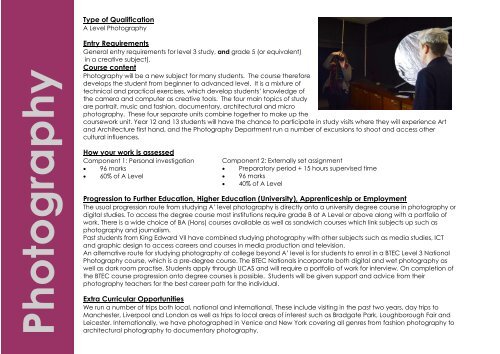Sixth Form Options Booklet 2019-21
Create successful ePaper yourself
Turn your PDF publications into a flip-book with our unique Google optimized e-Paper software.
Photography<br />
Type of Qualification<br />
A Level Photography<br />
Entry Requirements<br />
General entry requirements for level 3 study, and grade 5 (or equivalent)<br />
in a creative subject).<br />
Course content<br />
Photography will be a new subject for many students. The course therefore<br />
develops the student from beginner to advanced level. It is a mixture of<br />
technical and practical exercises, which develop students’ knowledge of<br />
the camera and computer as creative tools. The four main topics of study<br />
are portrait, music and fashion, documentary, architectural and micro<br />
photography. These four separate units combine together to make up the<br />
coursework unit. Year 12 and 13 students will have the chance to participate in study visits where they will experience Art<br />
and Architecture first hand, and the Photography Department run a number of excursions to shoot and access other<br />
cultural influences.<br />
How your work is assessed<br />
Component 1: Personal investigation<br />
96 marks<br />
60% of A Level<br />
Component 2: Externally set assignment<br />
Preparatory period + 15 hours supervised time<br />
96 marks<br />
40% of A Level<br />
Progression to Further Education, Higher Education (University), Apprenticeship or Employment<br />
The usual progression route from studying A’ level photography is directly onto a university degree course in photography or<br />
digital studies. To access the degree course most institutions require grade B at A Level or above along with a portfolio of<br />
work. There is a wide choice of BA (Hons) courses available as well as sandwich courses which link subjects up such as<br />
photography and journalism.<br />
Past students from King Edward VII have combined studying photography with other subjects such as media studies, ICT<br />
and graphic design to access careers and courses in media production and television.<br />
An alternative route for studying photography at college beyond A’ level is for students to enrol in a BTEC Level 3 National<br />
Photography course, which is a pre-degree course. The BTEC Nationals incorporate both digital and wet photography as<br />
well as dark room practise. Students apply through UCAS and will require a portfolio of work for interview. On completion of<br />
the BTEC course progression onto degree courses is possible. Students will be given support and advice from their<br />
photography teachers for the best career path for the individual.<br />
Extra Curricular Opportunities<br />
We run a number of trips both local, national and international. These include visiting in the past two years, day trips to<br />
Manchester, Liverpool and London as well as trips to local areas of interest such as Bradgate Park, Loughborough Fair and<br />
Leicester. Internationally, we have photographed in Venice and New York covering all genres from fashion photography to<br />
architectural photography to documentary photography.


